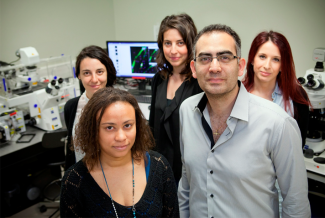 A study by Xavier Nissan’s research team from I-Stem, in collaboration with Pr Nicolas Lévy’s (Aix-Marseille University – INSERM UMR_S910, Faculté de Médecine de Marseille), Dr Lino Ferreira’s (Coimbra University, Portugal) teams enabled to show the therapeutic potential of retinoic acid (Vitamin A) in the treatment of progeria.
A study by Xavier Nissan’s research team from I-Stem, in collaboration with Pr Nicolas Lévy’s (Aix-Marseille University – INSERM UMR_S910, Faculté de Médecine de Marseille), Dr Lino Ferreira’s (Coimbra University, Portugal) teams enabled to show the therapeutic potential of retinoic acid (Vitamin A) in the treatment of progeria.
Hutchinson-Gilford progeria syndrome is a rare genetic disease which causes accelerating aging to children. It is triggered by the mutation of LMNA gene which leads to the production of a truncated protein called progerin. One child out of 20 million in the world is affected by this disease.
Learn more about progeria
Among the 2,800 medications tested in the study, two types of retinoids, the all-trans-retinoic acid and 13-cis-retinoic acid, have proved to be the only ones to enable to significantly restrain the aging process of stem cells. Indeed, retinoic acid blocks the synthesis of progerin, the toxic protein whose accumulation within the cells leads to cellular dysfunctions.
Numerous studies have shown progerin accumulation is also involved in the course of normal physiological aging. Therefore, the results from this study open new paths of research to treat pathological consequences linked to normal aging.
This two retinoic compounds are now to be evaluated on progeria animal models.
This study is published today in the Scientific Reports by Nature Publishing Group.
High-throughput screening: an innovative method to identify treatments for rare diseases
High-throughput screening is a technique, commonly used by the pharmaceutic industry, which enables to test thousands of drug candidates simultaneously. Since 2005, and thanks to AFM-Téléthon’ support, I-Stem combines this method with stem cells to identify new efficient molecules to treat rare genetic diseases.
Entirely robotic, high-throughput screening enables to multiply laboratories’ testing capacity. To date, dozens of I-Stem‘s teams use this technique to identify treatments for pathologies such as Huntington’s disease (HD), limb girdle muscular dystrophies (LGMD), Duchenne muscular dystrophy (DMD) or Spinal Muscular Atrophy (SMA). Recently, researchers from I-Stem thereby brought to light lithium repositioning to treat autism and retinoic acid to treat progeria.

